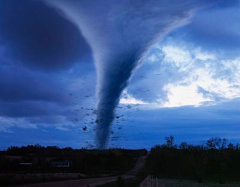 Damage and power outages from the devastating tornadoes striking Alabama prompt the Alabama Department of Public Health to remind people about the many hazards that follow natural disasters. Be sure to listen to and follow emergency information provided by local officials.
Damage and power outages from the devastating tornadoes striking Alabama prompt the Alabama Department of Public Health to remind people about the many hazards that follow natural disasters. Be sure to listen to and follow emergency information provided by local officials.
• Do not endanger yourself or others. Use caution when entering any structure that has been damaged. The damage could be worse than it appears, and the structure could collapse. Walk carefully around the outside and check for loose power lines and gas leaks. Do not enter if you smell gas, and report any natural gas leaks to the gas company immediately.
• Dress appropriately. Wear sturdy shoes or boots, long sleeves, gloves and a protective mask when handling or walking on or near debris. Watch for broken glass and hardware, such as exposed nails. Wash your hands thoroughly and often with soap and clean water when working in debris.
• Never touch a downed power line, or an object in contact with a downed line. Report any potential electrical hazards to law enforcement authorities and the utility company immediately. If a power line falls on a car, do not get out of the vehicle and warn others not to touch the vehicle or the line.
• Know the proper safety procedures and operating instructions for any gas-powered or electric saws or tools before using them. Using them without the proper knowledge can be deadly. Beware of injury from the release of bent trees or branches.
• Never use generators, pressure washers, grills, camp stoves or other gasoline, propane, natural gas or charcoal-burning devices inside your home, basement, garage or camper – or even outside near an open window, door or vent. These items emit carbon monoxide, an odorless, colorless gas that can cause sudden illness and death if you breathe it in.
Symptoms are dizziness, light-headedness and nausea. Seek medical attention immediately if you suspect carbon monoxide poisoning. Never hook up a generator to wiring installed in a home because this can create back feed in electrical wires which could injure or kill utility workers repairing electrical lines.
• Clean up spilled medications, flammable liquids and other potentially hazardous materials immediately.
• As people work long days following the tornadoes, be sure to avoid dehydration by drinking plenty of cool, non-alcoholic fluids each hour. Do not drink any tap water, since water may be contaminated due to damaged water lines and piping. If working outside, protect yourself from the sun by wearing a wide-brimmed hat and sunglasses. People unaccustomed to working or exercising in a hot environment should work during the cooler hours of the day when possible.
Elderly people, infants, children and people with chronic medical conditions such as heart disease, diabetes, a previous stroke or obesity are more prone to heat stress. People using medications for high blood pressure, nervousness or depression are also at higher risk.
• Use battery-powered lanterns or flashlights instead of candles. If you must use a candle, be sure the candle is in a sturdy holder and that it is kept away from curtains, paper, wood or other flammable items. Never leave a lit candle unattended.
• Be wary of wildlife and other animals. Wild animals have an unpredictable nature, so do not attempt to capture or handle them.
Injury prevention information is available at http://www.adph.org/injuryprevention/



